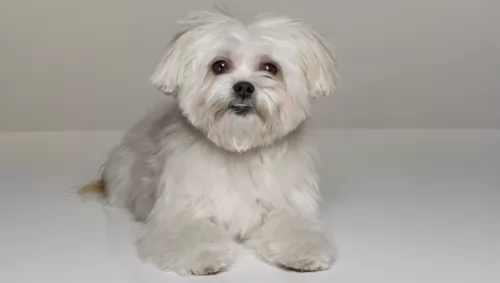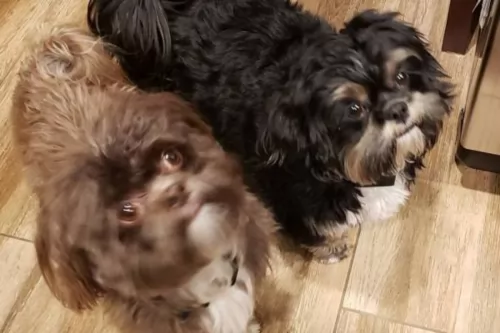 Petzlover
Petzlover Kyi-Leo is originated from United States but Saluki is originated from Iraq. Kyi-Leo may grow 41 cm / 16 inches shorter than Saluki. Kyi-Leo may weigh 24 kg / 52 pounds lesser than Saluki. Both Kyi-Leo and Saluki has almost same life span. Both Kyi-Leo and Saluki has same litter size. Both Kyi-Leo and Saluki requires Moderate Maintenance.
Kyi-Leo is originated from United States but Saluki is originated from Iraq. Kyi-Leo may grow 41 cm / 16 inches shorter than Saluki. Kyi-Leo may weigh 24 kg / 52 pounds lesser than Saluki. Both Kyi-Leo and Saluki has almost same life span. Both Kyi-Leo and Saluki has same litter size. Both Kyi-Leo and Saluki requires Moderate Maintenance.
 The Kyi-Leo first came about in the 1950s in San Francisco, USA, with the crossing of two dog breeds – the Lhasa Apso and the Maltese.
The Kyi-Leo first came about in the 1950s in San Francisco, USA, with the crossing of two dog breeds – the Lhasa Apso and the Maltese.
Because this is a mixed-breed dog, it isn’t recognized by the American Kennel Club, but it is recognized by some of the other dog associations such as the American Rare Breed Association or ARBA as it is known. Today the dog is looked upon as a designer breed.
 It seems as though the Saluki's origins go far back to ancient Egypt times. The dog is known for its superb hunting abilities.
It seems as though the Saluki's origins go far back to ancient Egypt times. The dog is known for its superb hunting abilities.
These dogs have been known in the Middle East and could be found in Iran and Egypt too. Breeding with other dogs was forbidden so the Saluki has remained unchanged for thousands of years.
It has always been known over the centuries for its superb grace and speed as well as endurance. He is capable of that because of the tall, sleek, muscular body and long, narrow head.
The Saluki came to England in the 1900s, and today the dog comes in quite a few variations.
 The Kyi-Leo is a small dog standing at 20 – 30cm in height and weighing in the region of 4 – 6kg.
The Kyi-Leo is a small dog standing at 20 – 30cm in height and weighing in the region of 4 – 6kg.
He has a long, silky coat which is essentially black and white or grey/silver and white or even gold and white. He has frail legs which can become injured or broken in vigorous rough and tumble games.
You can certainly describe the Kyi-Leo as a sweet, quiet, non-aggessive playful dog, and for anyone who wants a splendid pet and companion, this dog makes a great family pet and he won’t cost you an arm and a leg to feed either.
He also has an acute sense of hearing and this turns him into an excellent ‘alarm’ watch-dog. It is also a dog, that while he will love to join you on a walk, he isn’t a dog that is going to demand a lot of exercise.
He responds well to his human family, is easy-going and gentle, tending to be cautious around strangers. You can trust him to be an awesome playmate for children. In this instance, it’s the children who should be warned when playing with a dog like this as, because of his fragile build, he could easily be injured by children who haven’t been taught to respect animals.
Even though he is such an amicable pet, it will still be of benefit to you and him to have him trained and socialized. Then he responds well to basic commands such as sit, stay and lie-down.
Dogs who spend time with their family, pick up on the ‘culture’ of the family and they learn how to behave. Dogs who are left on their own and never socialized can become nervous and aggressive towards people as they never got to learn how to behave – they weren’t socialized.
 The Saluki is a graceful, elegant looking dog, deep chested and long legged, much like the Greyhound and fairly closely related to the Afghan Hound.
The Saluki is a graceful, elegant looking dog, deep chested and long legged, much like the Greyhound and fairly closely related to the Afghan Hound.
They stand at between 58 and 71cm and weigh between 16 to 29kg. The head is long and narrow, the eyes large and the dog has floppy ears. The tail is long and curved. The coat of the Saluki comes in a number of different colours and these can be fawn, cream, white, tan, some black or it can have a blend of all these colours. The coat of this dog comes in two types - smooth and the feathered type. The fur is always beautifully silky and is considered to be low-shedding.
These dogs are also very fast runners, and if you check the Guinness Book of Records, you’ll see that the Saluki is listed there as being one of the fastest dogs with tremendous stamina.
Th Saluki is a beautiful, quiet, dignified, reserved, loyal dog. You can just see that he is intelligent. He is certainly affectionate with his human family but you wouldn’t call him demonstrative. He isn’t the kind of dog to be wildly prancing around wagging his tail furiously.
He’s the kind of dog that likes to give chase so you’ll need a large garden for him. It’s why he isn’t suited for city life on a small property. The countryside is a far better option for this tall dog.
When he’s not outdoors, he can easily curl up on your sofa for a few hours of utter relaxation. Training and socialization will be necessary for this shy dog as it not only makes him obedient, but it gives him some confidence with knowing how to behave in different circumstances. He’ll get on well with older children, but is fairly indifferent and intolerant to small kids, especially those that are undisciplined and left to climb over him.
 The Kyi-Leo is everything you want in a family companion – active, playful, loving, gentle, happy and balanced.
The Kyi-Leo is everything you want in a family companion – active, playful, loving, gentle, happy and balanced.
He loves his human family but tends to be a little bit wary around strangers, gradually warming to them.
He may be small, but he is robust and alert, and he is also capable of making you a good watchdog.
The Kyi-Leo is an all-round great little pet to have.
 The Saluki loves his human family, and he’s the kind of dog that wouldn’t like to be owned by one family ad then given away to another later on. That's why make sure when you get your Saluki your intentions are to keep him.
The Saluki loves his human family, and he’s the kind of dog that wouldn’t like to be owned by one family ad then given away to another later on. That's why make sure when you get your Saluki your intentions are to keep him.
He likes to be comfortable too when they’re not running outside, and a good bed is important to him. Salukis are naturally thin, so make sure not to overfeed him. These are quiet, calm dogs, but over the centuries they've been making reliable, steadfast pets and companions.
 Your Kyi-Leo is such a feisty, robust little dog who is not likely to cost you much in terms of health care. With his frail legs, it is a good thing to know that you need to be careful with him in terms of back-and joint problems.
Your Kyi-Leo is such a feisty, robust little dog who is not likely to cost you much in terms of health care. With his frail legs, it is a good thing to know that you need to be careful with him in terms of back-and joint problems.
There are actually knee joint issues which are fairly common in small dogs, one of which is patellar luxation.
This is where the kneecap pops out of the thighbone, causing the dog to skip or hop. Some joint issues are genetic and may require surgery. Make sure to keep your pet’s weight under control to remove additional stress on the joints.
This is another dog illness you want to be careful with. Acute pancreatitis -inflammation - is when the condition comes on suddenly while chronic pancreatitis is when pancreatitis occurs over a period of time.
With acute pancreatitis in dogs you’ll see symptoms such as vomiting, abdominal pain, tremors and reluctance to eat. Pancreatitis can be brought on by too much fat, especially rancid fat, some anti-biotics, a low protein diet or a sickness such as diabetes.
If you suspect pancreatitis in your dog, get him as quickly as possible to the vet.
 We always mention hip dysplasia as a common dog ailment as so many dog breeds can succumb to this ailment. With the Saluki, hip dysplasia is uncommon. Cancer and cardiac issues are more prevalent with these dogs.
We always mention hip dysplasia as a common dog ailment as so many dog breeds can succumb to this ailment. With the Saluki, hip dysplasia is uncommon. Cancer and cardiac issues are more prevalent with these dogs.
It is sad to realize that dogs are susceptible to the same types of cancer as people are. If the uncontrolled growth of cells in the body isn’t discovered in time, cancer can reach the circulatory or lymph systems and other parts of the body. In fact, cancer is the leading cause of death with dogs. The good news is that it is treatable if you catch it in the early stages.
One of the more common types of cancer in dogs is Lymphoma. This can affect any dog, and at any age too. There are swollen lymph nodes under the neck and the dog can have trouble with breathing and digestion. You’ll notice lumps underneath the dog's skin, abnormal discharges from the eyes, ears or rectum, non-healing wounds, coughing and pain.
 The Kyi-Leo doesn’t require vigorous exercising. One walk a day will keep them happy. There are pet owners who believe dogs can be permanently outside dogs where they can do their own exercise.
The Kyi-Leo doesn’t require vigorous exercising. One walk a day will keep them happy. There are pet owners who believe dogs can be permanently outside dogs where they can do their own exercise.
Everybody who knows dogs, knows they are social creatures who will simply lie at your backdoor just waiting for some response from their beloved human family. Every dog, regardless of breed or size, needs exercise and interaction with their humans every day.
Dogs left alone in the yard day after day are loney, frustrated and bored, and when they start digging or barking, irresponsible owners will ill treat them. These kind of people should never own a dog.
The Kyi-Leo has a sensitive stomach so he’ll need good quality food to avoid digestive problems. Ideally home-cooked food such as softly boiled chicken, brown rice and raw or cooked vegetables added into top quality kibble is the preferred diet.
Fresh, cool water needs to be constantly available.
Brush the long, silky coat at least twice a week to ensure it remains free of knotting. Brushing keeps the coat shiny too.
As a long eared dog, ears should be checked and cleaned regularly too. Air doesn’t reach the inside of their ears and the warm dampness in the ears are a breeding place for infection.
Nails should also be trimmed when they become long because left uncut they can hook onto things causing injury ad pain.
Small dogs are more prone to tartar formation and loss of teeth. You’ll notice that something isn’t right because your lively little dog will be lethargic, he may not want to eat his food and his face may be swollen. When you suspect dental problems, get him to the vet.
 These tall, slender dogs love to run free and it's the kind of dog that will need regular and different forms of exercise.
These tall, slender dogs love to run free and it's the kind of dog that will need regular and different forms of exercise.
Provide your Saluki with a comfortable, warm, dry bed with lots of padding.
The Saluki has smooth, silky hair so brush it twice a week to keep it gleaming.
To help your Saluki have a strong immune system, he needs the best food there is. Good food packed with vitamins and minerals instead of preservative and colorants will help him fight diseases like cancer.
Commercially manufactured dog foods can be wonderfully convenient and nutritious if you get the better quality ones. Give him some home-made food too and add it twice a week to the dry kibble. This will provide variety and a tasty treat. Boiled chicken, brown rice, sweet potatoes, carrots and spinach are simple foods – just like dogs want.
Try and include some raw meat occasionally. Fresh, cool water should always be available around the clock.